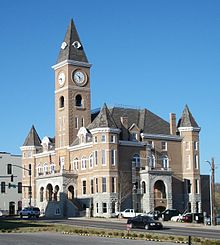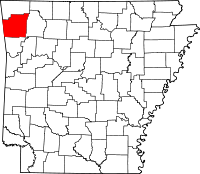Washington County, Arkansas
| Washington County, Arkansas | ||
|---|---|---|
| County | ||
| County of Washington | ||

|
||
|
||
 Location in the U.S. state of Arkansas |
||
 Arkansas's location in the U.S. |
||
| Founded | October 17, 1828 | |
| Named for | George Washington | |
| Seat | Fayetteville | |
| Largest city | Fayetteville | |
| Area | ||
| • Total | 952 sq mi (2,466 km2) | |
| • Land | 942 sq mi (2,440 km2) | |
| • Water | 10 sq mi (26 km2), 1.1% | |
| Population (est.) | ||
| • (2015) | 225,477 | |
| • Density | 215/sq mi (83/km²) | |
| ZIP code(s) | 72701, 72703, 72704, 72717, 72727, 72729, 72730, 72738, 72744, 72749, 72753, 72761, 72762, 72764, 72769, 72773, 72774, 72959 | |
| Area code(s) | 479 | |
| Congressional district | 3rd | |
| Time zone | Central: UTC-6/-5 | |
| Website | www |
|
Washington County is a county located in the northwest part of the U.S. state of Arkansas. As of the 2010 census, the population was 203,065, making it the third-most populous county in Arkansas. The county seat is Fayetteville. It is Arkansas's 17th county, formed on October 17, 1828, and named for George Washington, the first President of the United States. Washington County is part of the Fayetteville-Springdale-Rogers, AR-MO Metropolitan Statistical Area.
Washington County began as part of the Cherokee Territory, following an 1817 treaty. The area was next known as Lovely County, and one year later Washington County was created after another Cherokee treaty. The court house was centrally located in the city of Washington, modern-day Fayetteville (renamed to avoid confusion with Washington, Arkansas in South Arkansas). The Lee Creek Valley in southern Washington County contained many of the county's early settlements, including Cane Hill and Evansville.
Arkansas College and Cane Hill College were both founded in Washington County within a day of each other in 1834, with the University of Arkansas being founded in Fayetteville in 1871. The county witnessed major battles during the American Civil War, including the Battle of Fayetteville, the Battle of Prairie Grove, and the Battle of Cane Hill. The county then was sparsely settled and many residents were pro-Union, since slaves were few, plantations almost nonexistent, and news came via White River travelers, not from the southern part of the state. A Butterfield Overland Mail route was established through the county in 1858, causing more families to settle there.
...
Wikipedia

